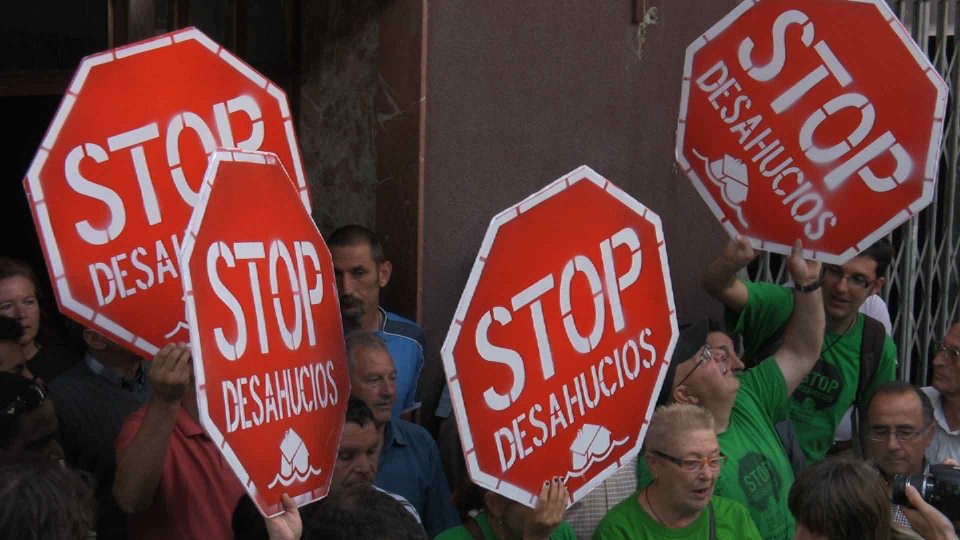
Promoting the right to adequate housing in Spain through UN mechanisms
- Civil society organizations and movements have formed a Monitoring Group to oversee the implementation of the United Nations Committee on Economic, Social and Cultural Rights (CESCR) ruling on the right to adequate housing.
The United Nations has become the last resort for guaranteeing the right to adequate housing in Spain. The ESCR Committee (CESCR) condemned Spain for the eviction of a family with two small children a year ago, in the case of Mohamed Ben Djazia and Naouel Bellil, and has interceded in 18 other eviction cases to date, requiring the State to suspend these evictions or provide alternative housing through precautionary measures.
A monitoring group was established to monitor compliance with the ruling
After the Optional Protocol to the International Covenant on Economic, Social and Cultural Rights entered into effect in 2013, the possibility of filing individual and collective complaints for ESCR violations was made available. The first resolution made by the CESCR against Spain was for violation of the right to adequate housing in a case of eviction by foreclosure in 2015. In the absence of the monitoring of compliance with this ruling, Spain did not implement any measures in this regard.
In order to avoid any recurrence of this sort of situation, several organizations that defend the right to adequate housing and human rights in Spain joined together in 2017 to create a monitoring group to ensure compliance with the directive, called the "ESCR Ruling Monitoring Group". The member organizations of the Platform include CAES Cooperativa, Amnesty International, Plataforma de Afectados por la Hipoteca (Platform of People Affected by Mortgages), Sindicato de Inquilinos (Tenants' Union), Arquitectura Sin Fronteras (Architecture Without Borders), Federación Regional de Asociaciones Vecinales de Madrid (Regional Federation of Neighborhood Associations of Madrid), Federación de Asociación de Vecinos y Vecinas de Barcelona (Federation of Neighborhood Associations of Barcelona), FEANTSA, and Observatorio DESC (ESCR Observatory).
[Consult the full ruling of the UNCESCR Committee (CESCR).]
- Spain's ESCR Platform seeks to monitor and follow up on the concluding observations of the CESCR.
Spain's ESC Rights Platform was created during the drafting of an alternate report for Spain’s periodic review process before the CESCR in March 2018. It is comprised of human rights and third sector organizations, professional associations, and trade unions.
The conclusions of the review issued by the Comité a España (Spain Committee) indicated several difficulties for ESCRs, especially in terms of the right to adequate housing and evictions, but also with regard to health and the rights of trade unions to organize. The United Nations recommended that Spain amend its legislation on evictions, increase the amount of social housing in order to ensure the rehousing of evicted persons, and develop a funded housing plan, which was one of the current complaints of the Right to Adequate Housing movements.
The Platform considers that the resolutions of the CESCR and other United Nations bodies must be complied with from a legal standpoint, and that these provide a suitable context to move toward greater safeguards. In 1977, Spain signed the Covenant on Human, Economic, Social and Cultural Rights; therefore, the rulings issued by the CESCR provide a guideline for interpreting jurisprudence that has also been undersigned by the Spanish state.
The Platform aims to encourage the transformation of United Nations rulings into practical responses on the part of the Spanish state. In this sense, it has promoted the creation of an interparliamentary group in the Congress of Deputies to facilitate said implementation. However, the Platform calls for a true interministerial body to carry out this task − a body that would undoubtedly be of great help in complying with International Human Rights Law, as well as Articles 10 and 96 of the Spanish Constitution, as stated by the UN.
